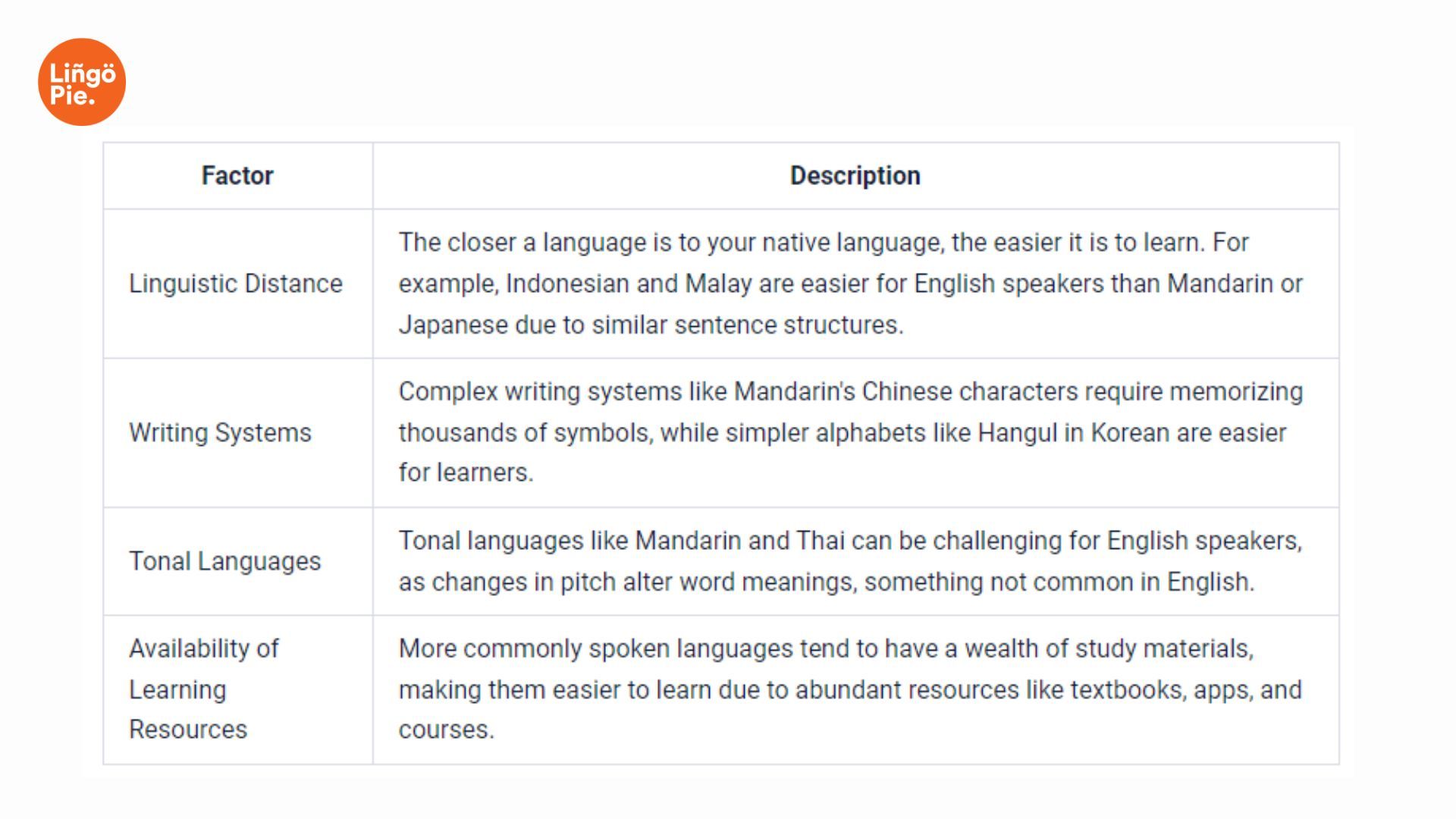Asian languages are gaining popularity worldwide, and for good reason. With about 1.5 billion people learning foreign languages globally, Mandarin Chinese has become a top choice, boasting over 100 million learners. This surge is largely due to China's growing economic influence.
But here's the thing: while Mandarin is popular, it's also known for being pretty challenging. The good news? Not all Asian languages are as tough to learn. In fact, some are much easier, especially for beginners or English speakers. So if you're interested in learning Asian languages but worried about the difficulty, you're in the right place.
In this article, I'll be ranking the 5 easiest Asian languages to learn, ranked for beginners. We'll consider factors like similarity to English, grammar complexity, writing systems, and available learning resources. Whether you're interested in widely spoken languages or looking for a new challenge, I've got you covered.
Why Learn Asian Languages?
You might be wondering, "Why should I bother learning an Asian language?" Well, beyond the cool factor of ordering dim sum in Mandarin or understanding your favorite K-pop lyrics, there are some pretty compelling reasons to view it as an investment for your future.
- Career Advancement: Studies have consistently shown that bilingualism can significantly boost earning potential. Research indicates that proficiency in a second language can increase salary by 5-20%, depending on the industry and language combination.
- Expanding Job Market: The U.S. Bureau of Labor Statistics projects a 20% increase in employment for interpreters and translators from 2020 to 2030, far outpacing the average for all occupations. This growth is particularly relevant for Asian languages due to increasing global economic ties.
- Economic Opportunities: China, Japan, South Korea, and India are leading in economic growth, generating substantial income and investing heavily in new technologies. Proficiency in these countries' languages can open doors to lucrative business opportunities.
- Global Competitiveness: As Asian countries continue to play larger roles in the global economy, proficiency in Asian languages is becoming increasingly valuable. The Asia Society reports that there's a growing demand for Asian language skills in fields like international business, diplomacy, and technology.
- Government Career Boost: The U.S. Department of State offers significant incentives for language skills, particularly in critical languages. According to their official careers page, candidates can earn language bonus points on the Foreign Service Officer Test for proficiency in Asian languages.
So whether you're eyeing that promotion, planning a career change, or just want to expand your horizons, picking up an Asian language could be your ticket to new and exciting opportunities. Ready to get started? Let's find out which Asian language might be the best fit for you!

Factors To Consider When Learning An Asian Language
Starting to learn an Asian language can be exciting, but it's important to understand what can make some languages harder or easier to learn. Based on my experience teaching languages across Asia, here are the key factors that affect how fast and easily you can pick up a new language:
Linguistic Distance
The closer a language is to your native language, the easier it is to learn. According to research by the Foreign Service Institute (FSI), English speakers tend to find languages like Indonesian or Malay easier to learn than languages like Mandarin or Japanese. This is because Indonesian and Malay have more familiar sentence structures.
Writing Systems
The complexity of writing systems also plays a significant role. For example, Mandarin uses Chinese characters, which can require memorizing thousands of symbols for literacy, whereas languages like Korean use the simpler Hangul alphabet. The difference in writing systems often makes languages with non-alphabetic scripts, such as Chinese or Thai, harder for learners.
Tonal Languages
Many Asian languages, like Mandarin and Thai, are tonal. For English speakers, learning to distinguish between tones, which can completely change word meanings, poses a unique challenge. Research has found that tonal languages are particularly difficult for speakers of non-tonal languages, such as English since tonal changes in pitch are unfamiliar.
Availability of Learning Resources
The number of available learning resources—like textbooks, apps, or language courses—can have a big impact on your progress. More commonly spoken languages often have a wealth of study materials, making them easier to learn.
What Are The Easiest Asian Languages To Learn?
Based on the factors above, here’s how we'll rank the easiest Asian languages to learn for English speakers:
- How similar the language is to English
- How simple the writing system is
- Whether the language is tonal or non-tonal
- Availability of learning resources
Remember, individual experiences may vary, and motivation plays a crucial role in language learning success. However, these factors can help you make an informed decision about which Asian language might be the best fit for your learning journey.
| Feature | Indonesian | Malay | Tagalog | Korean | Chinese (Mandarin) |
|---|---|---|---|---|---|
| Writing System | Latin alphabet | Latin alphabet | Latin alphabet | Hangul | Simplified/Traditional Characters |
| Native Speakers | ~200 million | ~300 million | ~32.5 million | ~75 million | ~1.3 billion |
| Official In | Indonesia | Malaysia, Singapore, Brunei | Philippines | South Korea, North Korea | China, Taiwan, Singapore |
| Language Family | Austronesian | Austronesian | Austronesian | Koreanic | Sino-Tibetan |
| Tonal? | No | No | No | No | Yes (4 tones) |
| Word Order | SVO | SVO | VSO | SOV | SVO |
| Difficulty (FSI) | Category II | Category II | Category III | Category IV | Category IV |
| Time to Fluency | 36-44 weeks | 36-44 weeks | 44 weeks | 88 weeks | 88 weeks |
Additionally, being the official language of Indonesia, the world’s fourth most populous country, it provides significant opportunities for travel, business, and cultural immersion.

Indonesian Language
If you're looking for the easiest Asian language to learn, Indonesian takes the crown. This language, spoken by over 200 million people across Indonesia and parts of Malaysia, offers a gentle introduction to the world of Asian languages. Its simplicity and accessibility make it an ideal starting point for language learners, especially those coming from an English-speaking background.
Indonesian stands out for several reasons:
- Familiar Alphabet: Uses the Latin alphabet, just like English
- Simple Grammar: No verb conjugations, no tenses, and no gender
- Phonetic Pronunciation: Words are pronounced exactly as they're written
- No Tones: Unlike many Asian languages, Indonesian is non-tonal
- Loan Words: Many words borrowed from English, Dutch, and Arabic
The Foreign Service Institute (FSI) categorizes Indonesian as a Category II language, estimating that it takes about 36-44 weeks (900-1100 class hours) to reach professional working proficiency. This is significantly less time compared to Category IV languages like Chinese or Korean, which can take up to 88 weeks.
Aside from common European languages, Indonesian is also taught in countries like Australia, Canada, Japan, and Hawaii. In the US and Britain, universities are also offering this foreign language under their foreign language program.
The best part? The Indonesian language shares many cognates with English, making vocabulary acquisition easier for English speakers. Here are some examples:
| Indonesian | English | Pronunciation |
|---|---|---|
| telepon | telephone | teh-leh-pon |
| komputer | computer | kom-poo-ter |
| musik | music | moo-seek |
| informasi | information | in-for-mah-see |
| kopi | coffee | ko-pee |
How To Learn Indonesian?
To effectively learn Indonesian, beginners should focus on immersion and practical language use from the start. Engaging in conversations with native speakers or language partners is highly beneficial, as Indonesian is widely spoken across social media and language exchange platforms.
Watching Indonesian TV shows or YouTube channels will also help improve listening comprehension, while daily practice using simple, everyday vocabulary can build confidence in speaking. Starting with basic conversational phrases, learners should gradually expand their vocabulary by using flashcards, language apps, or spaced repetition tools.

Malay Language
Hot on the heels of Indonesian, Malay emerges as another incredibly accessible Asian language for English speakers. Spoken by over 300 million people across Malaysia, Singapore, and Brunei, Malay shares many similarities with Indonesian, making it an equally attractive option for language learners. Its widespread use in bustling economic hubs like Singapore adds to its appeal for those looking to expand their professional horizons in Southeast Asia.
Malay's learner-friendly features include:
- Latin Alphabet: Uses the familiar Roman script
- Straightforward Grammar: No complex conjugations or tenses
- Logical Structure: Subject-Verb-Object (SVO) word order, just like in English
- Phonetic Nature: Syllabic nature
- English Influence: Many English loan words, especially in Singapore's colloquial Malay
According to the Foreign Service Institute (FSI), Malay's learning curve is remarkably gentle. Classified as a Category II language, Malay only requires approximately 36-44 weeks (900-1100 class hours) to achieve professional working proficiency. This puts it on par with Indonesian and makes it significantly easier than many other Asian languages.
Malay, like Indonesian, has borrowed many words from English. Here are some common words that are nearly identical:
| Malay | English | Pronunciation |
|---|---|---|
| bas | bus | bahs |
| hospital | hospital | hos-pi-tal |
| restoran | restaurant | res-to-ran |
| teksi | taxi | tek-see |
| universiti | university | oo-ni-ver-si-ti |
For travelers or expatriates, the language is particularly useful, making the learning process both practical and rewarding.
How To Learn Malay?
When learning Malay, it is helpful to focus on understanding regional differences in how the language is used across Malaysia, Singapore, and Brunei. Immersing yourself in Malay culture through music, films, or even radio stations from these regions will expose you to the nuances of spoken Malay.
Learners should also prioritize mastering the foundational grammar and sentence structure, which follows a straightforward Subject-Verb-Object (SVO) order, similar to English.

Tagalog Language
Tagalog (or Filipino), spoken by over 32.5 million people worldwide, is an attractive option for learners due to its mix of Malay, Spanish, and English influences. Its sentence structure and vocabulary contain many familiar elements for English speakers, and the use of the Latin alphabet makes learning to read and write easier than in other Asian languages.
Key features of Tagalog:
- Uses the Latin alphabet with a few extra letters
- Many English loanwords
- Verb-focused sentence structure
- No verb conjugations for tense
- No gender for nouns
While verb conjugation can be a bit complex, the overall learning curve is manageable with regular practice.
The Foreign Service Institute ranks Tagalog as a Category III language, taking about 44 weeks to reach professional proficiency. This puts it in the middle range for English speakers - harder than Indonesian, but easier than Chinese or Korean.
What makes Tagalog stand out is its global reach. It's widely spoken in Filipino communities across the US, Canada, and the Middle East. Learning Tagalog not only connects you to the Philippines but to a vast international network.
While Tagalog has fewer direct cognates with English, it has incorporated many English words. Here are some examples:
| Tagalog | English | Pronunciation |
|---|---|---|
| kompyuter | computer | kom-pyu-ter |
| telebisyon | television | te-le-bis-yon |
| dyip | jeep | jeep |
| iskul | school | is-kul |
| silya | chair | sil-ya |
With a large Filipino diaspora around the world, learning Tagalog can also help you connect with Filipino communities globally.
How To Learn Tagalog?
Tagalog learners should focus on building a strong foundation in verb conjugation, which can initially seem complicated but follows predictable patterns once understood. A practical approach is to start with common conversational phrases and even Tagalog jokes and then gradually learn how to manipulate verbs in different tenses.
More importantly, listening to Filipino media such as news broadcasts, TV shows, or podcasts is an effective way to immerse yourself in the language and improve listening comprehension.


Korean Language
Korean, with its over 75 million speakers worldwide, isn't the easiest Asian language to learn - but it might be the most supported. Its growing global influence has created a boom in learning resources and communities, making it more accessible than ever.
Why Korean stands out:
- Logical Hangul alphabet: Hangul is considered one of the most logical alphabets in the world, designed specifically to be easy to learn and use.
- Rich cultural content: K-dramas, K-pop, and movies for immersion
- No grammatical gender or articles
- Consistent pronunciation rules
While grammar can be a bit tricky with its levels of politeness and sentence structure, learners often find the clear pronunciation and consistent spelling patterns easier than expected.
The Foreign Service Institute rates Korean as Category IV, estimating 88 weeks to proficiency. But here's the highlight of them all: the surge in Korean language enthusiasm is a good factor to consider because of the...
- Surging Demand: Korean is the second most sought-after language by Americans, with 130,000+ monthly Google searches
- Growing Academic Presence: U.S. university Korean learners increased from 13,900 in 2016 to 19,300 in 2021
- Global School Integration: As of 2021, 1,806 schools in 42 countries offer Korean as an elective
- Booming Industry: The Korean language learning market was valued at over $5.5 billion in 2023
- Rapid Growth: Projected 20% CAGR for the Korean language learning market from 2024 to 2032
Korean has fewer cognates with English, but there are some borrowed words that are easy to recognize:
| Korean | English | Pronunciation |
|---|---|---|
| 커피 (keopi) | coffee | keo-pi |
| 버스 (beoseu) | bus | beo-seu |
| 텔레비전 (tellebijeon) | television | tel-le-bi-jeon |
| 아이스크림 (aiseukeurim) | ice cream | ai-seu-keu-rim |
| 주스 (juseu) | juice | ju-seu |
How To Learn Korean?
For learning Korean, it’s important to master Hangul, the Korean alphabet, first, as it can be learned in a few hours and sets the stage for deeper language understanding. Once comfortable with reading and writing, focus on learning simple sentence patterns and gradually work towards more complex grammar, including politeness levels.
Watching Korean dramas, variety shows, or listening to K-pop songs can be a fun way to immerse yourself in the language, but pairing this with structured learning through apps or lessons will ensure steady progress.


Chinese Language
Mandarin Chinese is often seen as challenging due to its tonal nature and logographic writing system, but it has several aspects that make it easier for learners, especially those with the right approach. For instance, Mandarin grammar is quite straightforward compared to European languages, with no verb conjugations, plurals, or tenses.
Key factors making the Chinese language more approachable:
- Phonetic system: Pinyin provides a romanized way to learn pronunciation
- Abundant resources: Over 500 apps dedicated to Chinese learning
- Immersion opportunities: 550 Confucius Institutes worldwide offering language courses
While the Foreign Service Institute still categorizes Chinese as a Category IV language (requiring 2200 hours to reach proficiency), modern learning methods are speeding up the process.
While Chinese has fewer direct cognates with English, it has adopted some English words, particularly for modern concepts:
| Chinese (Pinyin) | English | Pronunciation |
|---|---|---|
| kāfēi (咖啡) | coffee | kah-fay |
| qiǎokèlì (巧克力) | chocolate | chyao-kuh-lee |
| bāshì (巴士) | bus | bah-shih |
| shāfā (沙发) | sofa | shah-fah |
| wǎngqiú (网球) | tennis (lit. "net ball") | wahng-chyou |
Additionally, as one of the most widely spoken languages in the world, the availability of resources like apps, language exchanges, and immersion opportunities is vast.
How To Learn Chinese?
When starting with Mandarin, it’s helpful to focus on mastering pinyin, the Romanized system for learning pronunciation, before tackling Chinese characters. Learners should prioritize high-frequency vocabulary and commonly used characters, ensuring they can engage in basic conversations early on.
Additionally, practicing listening to Chinese podcasts or shows, even at beginner levels, can help reinforce pronunciation and tone recognition.

Other Asian Languages Worth Learning
While our top five languages are among the easiest for beginners, there are several other Asian languages worth exploring based on your interests, career goals, or travel plans.
- Japanese: Although considered more difficult due to the use of three writing systems (Hiragana, Katakana, and Kanji), Japanese grammar is relatively consistent and lacks many of the complexities found in other languages like verb conjugations or noun genders.
- Thai: Thai is a tonal language, which can present challenges, but its simple grammar (no verb conjugations, plurals, or articles) makes it accessible once you get the basics down.
- Hindi: Hindi’s complex script, Devanagari, has letters that combine vowels and consonants in ways that require time to master. Additionally, gendered nouns and verb conjugations can be difficult for beginners to keep track of.
- Vietnamese: Like Thai, Vietnamese is a tonal language, but it uses the Latin alphabet, which makes reading and writing easier for English speakers.
- Burmese: While the Burmese language is lesser-known, it’s an important language for those interested in the cultural diversity of Southeast Asia.
- Khmer: Khmer uses one of the largest alphabets in the world, with intricate consonant and vowel combinations. Its lack of clear word boundaries adds complexity for learners.
- Lao: Lao is a tonal language with six tones, and its script, derived from ancient Indian scripts, has complicated vowel structures, which can be tough for new learners to grasp.
- Tamil: Tamil features a unique and ancient script, and the language itself is highly inflectional, meaning that word endings change depending on tense, mood, and politeness, adding complexity for learners.
Start Your Asian Language Journey With Lingopie
While we've ranked these languages based on their relative ease for English speakers, remember that the "easiest" language is often the one you're most motivated to learn. And when it comes to motivation, having the right tools can make all the difference.
While we don't offer courses in all the languages mentioned, Lingopie specializes in two of the most sought-after Asian languages: Korean and Chinese. Our innovative platform uses real-world TV shows and movies to immerse you in authentic language and culture, making the learning process both effective and enjoyable.
With Lingopie's binge-learning method, you can:
- Watch popular Korean dramas and Chinese films with interactive subtitles
- Learn vocabulary and grammar in context
- Practice your listening skills with native speakers
- Track your progress and set personalized learning goals
Whether you're taking your first steps into the world of Asian languages or looking to enhance your existing skills, Lingopie provides a supportive and engaging environment for your language-learning journey.
Ready to dive into Korean or Chinese? Start your free trial with Lingopie today and discover how enjoyable and rewarding learning an Asian language can be.







![5 Official Spanish Language Tests To Show Your Proficiency Level [Guide]](/blog/content/images/size/w300/2025/06/Spanish-Language-Tests.jpg)
![Why Memorizing Spanish Words Won’t Make You Fluent [Tips]](/blog/content/images/size/w300/2025/06/how-to-practice-spanish-vocabulary.jpg)
![How to Improve Your Polish Conversation Skills [5 Best Tips]](/blog/content/images/size/w300/2025/06/improve-polish-conversation-skills.jpg)
